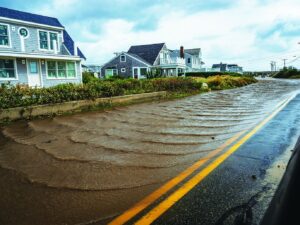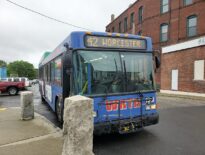While across the nation homeowners of color are more likely to face major climate hazards, in the Boston area climate risk is largely the same across racial demographics according to a new Zillow analysis.
In Greater Boston, wind risk is the highest for Black homeowners; 99 percent face significant risk of wind damage from hurricanes, tornadoes or other severe storms. For white homeowners, 96.4 percent of homeowners face significant wind risk.
When it comes to flooding, the risk is smaller and the exposure varied. Zillow data showed that 14.7 percent of Hispanic homeowners and 14 percent of Asian homeowners in the Boston area are exposed to high flood risk, while 12.1 percent of Black and white homeowners, each, are exposed.
The disparity is greatest in regards to severe heat risk, as 86.8 percent of Black homeowners face significant risk compared to 68 percent of white homeowners. The impacts of major heat risk are greater for lower-income households and communities that are less likely to afford the cost of energy necessary to cool their homes.
The Environmental Protection Agency found that Black people are 40 percent more likely than other racial groups to live in areas with the highest projected increases in mortality rates due to extreme temperatures. The same study found that Hispanic and Latino people are 43 percent more likely to live in areas with the highest projected labor hour losses due to higher temperatures.
Zillow’s data did not show major air quality risks for any Boston-area homeowners, and wildfires are only a small risk in the region.
Nationally, the differences are much greater. 80.9 percent of Black homeowners face significant heat risk compared to 52.3 percent of white homeowners. In regard to wind risk, 59.6 percent of Back homeowners face significant wind risk while 32.1 percent of white homeowners face significant wind risk.
“The disproportionate burden of climate risk on homeowners of color threatens to deepen financial inequality,” Kara Ng, senior economist at Zillow said in a statement. “Climate risk is driving up homeownership costs due to rising insurance premiums and potential repair or rebuilding expenses after disasters. These added financial pressures can make it harder for families to build and maintain wealth through homeownership.”
Zillow’s research notes that climate risk is increasing the cost of homeownership, with rising insurance and energy costs needed to heat and cool homes.






